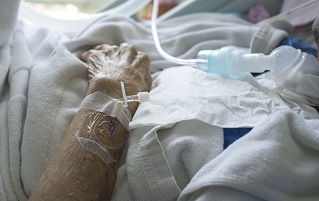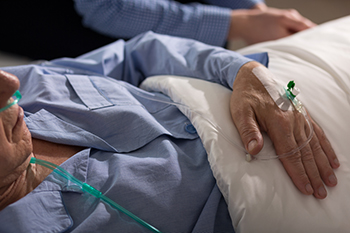I Watch People Die For A Living: 4 Things I've Learned

"Everybody dies." That's not merely the tagline for George R.R. Martin's next book, nor the creepy guy from accounting's email signature. It's a fact. You will die, and I have the enviable job of helping you do it. No, I'm not Bruce Willis; I'm a hospice nurse. I can't tell you exactly when and how you'll die -- that's still the exclusive territory of witches and Christopher Walkens -- but I can tell you what most of your final days will look like.
Here's What Happens To Your Body As You Die

First, your body's systems and senses shut down. Many experts agree that the sense of touch is the last to go, along with your hearing, but you wouldn't guess that by looking at the skin, which goes all corpsey long before it should. The lungs can indeed give off an audible death rattle, and we can even tell approximately how much time is left by the distinctive tone of the rattle. It's a neat party trick, if you never want to be invited to parties again.

"Mmm ... great dip. Now, as I was saying about the specter of mortality which looms over us all ..."
Surprisingly, it's bad news if we don't hear the rattle anymore; that means you have the approximate shelf life of pancake batter. Also, much like pancakes, you give off a sweet smell -- the result of acidosis, or the breakdown of internal sugars. Those hospital cats that can predict when patients die? They don't have Miriam Black psychic powers; they simply have a heightened sense of smell.
In your last days, you'll be so divorced from consciousness that you'd drown on a sip of water. That's why many people don't actually die of their illness -- they die of dehydration. But the drying-out process can start long before the loss of consciousness sets in. When your health starts to decline, you'll likely refuse food and water anyway. Relatives might suggest attaching an IV, but I (and hopefully the doctor) will discourage this. Your body may not do anything with the fluid, which means the water could accumulate and result in acute heart failure. With feeding tubes, the solution may do nothing but sit in your stomach, which puts you at risk for a severe infection that'd kill you faster than if you'd done nothing. Trust me, "rotting from the inside out via spoiled Ensure" is not the best way to go.

Having a feeding tube sucks enough without it killing you in the process.
You can plan them as carefully as you'd like, but you probably won't have any coherent last words. Some people, usually those with some underlying cardiac or respiratory complication, exhibit "air hunger" immediately before death. We also call this "terminal restlessness." You look like you're drowning in the air. You become disoriented and frantic. I'll see you pulling off your clothing, pulling out your tubing, stretching yourself, writhing in bed, crawling or rolling on the floor. You're probably going to hallucinate. Patients on particularly fun medications can see spiders or insects on the walls, but usually it's dead relatives or other phantoms. We recognize that as a clinically significant occurrence that happens shortly before death. We know it happens, but we don't tell the terminally ill that they're not really being escorted to heaven by Air Bud. We're not monsters.
Abuse And Neglect Are Rampant In Hospice Care

Once, an elderly female dementia patient of mine was shouting at the staff. Then she rolled her wheelchair to the drinking fountain, filled a cup with water, and threw it at a nurse. That's not exactly sociable behavior, sure, but she was confused and dying, and it was just water, after all. That didn't matter. The nurse called for backup, and the two of them wheeled the patient into a spare room. I heard shouting, and peeked in to see that they'd pulled the woman out of her wheelchair and were injecting her with an unidentified medication. It was like watching a Wrestlemania battle royale, if there was ever a Wrestlemania battle royale in which only one person showed up for their entire team, and it was a dying lady in a wheelchair.
Obviously, I wrote up this incident and notified the director of nursing. My job was subsequently terminated. Yes, mine.

Patient care industries don't always have a stellar record with that kind of thing.
I went on nursing elsewhere, where I saw other patients suffering all kinds of abuse. In one nursing home, I examined another dementia patient, bed-bound and unable to speak or move herself. I found she had a Stage 4 pressure ulcer on her right buttock. She had, in the least-metaphorical sense, ripped herself a new asshole, and this facility was using rolled-up hand towels to pack the wound. I notified the director of nursing, and miraculously, I wasn't fired this time. In fact, the director was appalled by the situation. The staff nurse was questioned about why towels were being used instead of wound care supplies, and she replied, "She's going on hospice, so it shouldn't make any difference." When you're going to die, some people take that as license to treat you like you're already dead.
The Dying Get Mad Drugs ... If They Don't Get Stolen First

Hospice patients often get a liquid morphine or oxycodone prescription as soon as they're admitted, along with liquid anti-anxiety drugs. In a general nursing setting, physicians are extremely reluctant to prescribe those drugs because of the high potential for abuse. But because that's not really a risk here, everyone gets to party like an extremely sad rock star.
The caregivers are a far bigger risk than the drugs. When the patient gets home care, which most of them do, drugs may be kept in a lockbox. The key is given to someone in the home other than the patient (a "trusted caregiver") to keep the patient from turning into Bubbles from The Wire. Sometimes, this security is necessary; often, it's not. And, of course, that doesn't stop the caregiver from digging into the stash. To guard against this, we compound medications in some other route to make them less appealing to drug seekers. No fun syringes or simple pills -- we apply creams, we use patches, we even administer suppositories for a lot of medications. The street value for Oxy goes way down if you have to shove it up your ass.

Though we imagine the street names start to get pretty interesting.
For sending drugs to patients' homes, we use a fairly insecure system: plain ol' UPS. Assuming relatives didn't take the drugs and blame the mailman, a lot of these boxes get stolen off of porches. I don't know how thieves can spot what to steal from the street. There must be mobs of tweakers out there, carefully inspecting every package you get on the off chance that it's medical-grade heroin this time instead of another book about boning dinosaurs (or whatever it is you normally order online).
There's A Lot Of Drama In The Hospice Ward

Around 1:00 one morning, I was called in for a death pronouncement on a woman who resided in an assisted living facility. I went about my usual routine, calling the funeral home and the patient's emergency contact. I had to tell the latter that, due to the very common misconception that all hospice patients have default "do not resuscitate" orders, their loved one died because of the response team's neglect.
An hour later, that emergency contact -- a family member -- arrived, screaming loud enough to wake the dead. Which, unfortunately, does not work. Otherwise, that problem would have fixed itself. Soon, more family members arrived -- cousins, nieces, nephews, grand-uncles, dog-walkers -- every one of them hollering and crying. One saw the body and instantly threw herself on the floor, shaking violently. Then she got up and lay atop the corpse, still crying and shouting. Remember, this wasn't the funeral. The patient had died hours before, was not embalmed, and was probably leaking all kinds of fluids.

As we've mentioned before, bodies get disgusting way faster than most people realize.
It was close to 4:00 a.m. before the funeral home arrived to pick up the body and those distraught family members started to leave. That reaction seems Hollywood-caliber extreme to most of us, but maybe that's because we don't have anybody who loves us enough to go Pentecostal at our passing.
Ryan Menezes is an editor and interviewer here at Cracked. Follow him on Twitter for stuff cut from this article and other things no one should see.
Have a story to share with Cracked? Email us here.
For more insider perspectives check out 5 Horrifying Things Real Dead Bodies Do (Too Weird For TV) and 5 Horrifying Truths About Funeral Homes (From An Undertaker).
Subscribe to our YouTube channel, and check out The 8 Most Unintentionally Hilarious Amateur Music Videos, and other videos you won't see on the site!
Also, follow us on Facebook, and let's be best friends forever.